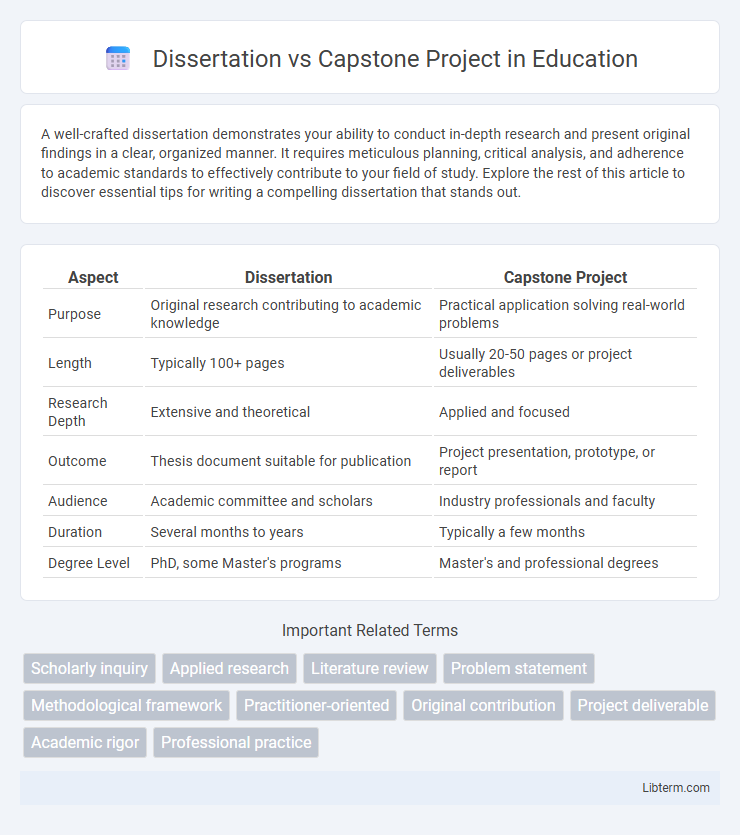A well-crafted dissertation demonstrates your ability to conduct in-depth research and present original findings in a clear, organized manner. It requires meticulous planning, critical analysis, and adherence to academic standards to effectively contribute to your field of study. Explore the rest of this article to discover essential tips for writing a compelling dissertation that stands out.
Table of Comparison
| Aspect | Dissertation | Capstone Project |
|---|---|---|
| Purpose | Original research contributing to academic knowledge | Practical application solving real-world problems |
| Length | Typically 100+ pages | Usually 20-50 pages or project deliverables |
| Research Depth | Extensive and theoretical | Applied and focused |
| Outcome | Thesis document suitable for publication | Project presentation, prototype, or report |
| Audience | Academic committee and scholars | Industry professionals and faculty |
| Duration | Several months to years | Typically a few months |
| Degree Level | PhD, some Master's programs | Master's and professional degrees |
Introduction to Dissertation and Capstone Project
A dissertation is an extensive academic research document required for a doctoral degree that presents original findings and contributes new knowledge to a specific field. A capstone project, commonly completed in undergraduate or master's programs, integrates and applies learned skills to solve real-world problems, often culminating in a practical deliverable or presentation. Both serve as culminating academic experiences but differ in scope, research depth, and purpose.
Defining Dissertation: Scope and Purpose
A dissertation is an extensive, research-driven academic document required for doctoral degrees, aiming to contribute new knowledge or theories within a specific field. It demands a deep investigation of a narrowly focused topic, demonstrating the student's ability to conduct original research, analyze data, and present findings coherently. The scope of a dissertation is broad, involving a comprehensive literature review, methodological rigor, and critical interpretation, ultimately advancing scholarly understanding.
Understanding Capstone Project: Goals and Structure
A Capstone Project serves as a culminating academic experience designed to integrate knowledge through practical application in real-world scenarios. It typically involves problem-solving tasks, research, and presentation components that demonstrate a student's ability to apply theories learned throughout their course. Unlike a Dissertation, which emphasizes original research contributing to academic knowledge, a Capstone Project prioritizes practical outcomes and professional skill development.
Key Differences Between Dissertation and Capstone Project
A dissertation involves extensive original research aimed at contributing new knowledge to a specific academic field, typically required for a doctoral degree, whereas a capstone project emphasizes practical application of existing knowledge to solve real-world problems, often for professional or master's programs. Dissertations require a formal structure including literature review, methodology, data analysis, and conclusion, while capstone projects may include project design, implementation, and reflection without rigorous research protocols. The evaluation of a dissertation centers on academic originality and theoretical advancement, contrasting with the capstone's focus on practical outcomes and professional skill demonstration.
Academic Requirements for Each Project
Dissertation requirements demand extensive original research, a comprehensive literature review, and a formal defense, aiming to contribute new knowledge to the academic field. Capstone projects emphasize practical application of learned skills, often involving problem-solving within real-world contexts and culminating in a presentation rather than a defense. Both require strong analytical abilities, but dissertations prioritize theoretical depth while capstones focus on applied learning outcomes.
Research Methodologies: Dissertation vs Capstone
Dissertations emphasize original research with rigorous methodologies such as qualitative, quantitative, or mixed methods to generate new knowledge or theories. Capstone projects often incorporate applied research techniques like case studies, surveys, or program evaluations aimed at solving practical problems or demonstrating professional skills. While both require systematic inquiry, dissertations prioritize theoretical contribution, whereas capstones focus on pragmatic implementation of existing research.
Duration and Time Commitment
A dissertation typically requires a longer duration, often ranging from one to three years, involving extensive research, data analysis, and writing, demanding a substantial time commitment throughout the academic program. In contrast, a capstone project usually spans a shorter period, typically a single semester or less, concentrating on practical application and synthesis of knowledge with a more intensive but brief time investment. The extended timeline of a dissertation supports deeper scholarly inquiry, while the capstone project emphasizes timely completion and integration of skills.
Factors to Consider When Choosing
Choosing between a dissertation and a capstone project depends on the academic goals, research interests, and career aspirations of the student. Consider the depth of research required, as dissertations demand original contributions to knowledge through extensive research, while capstone projects emphasize practical application and problem-solving. Time commitment and academic discipline also play crucial roles, with dissertations typically requiring longer durations and being more common in research-focused programs, whereas capstones suit applied fields and shorter timelines.
Career Impact and Opportunities
Dissertations typically emphasize original research and contribute to academic knowledge, enhancing opportunities for careers in academia, research, and advanced scholarly roles. Capstone projects focus on practical application and problem-solving skills, making them valuable for careers in industry and professional practice where hands-on experience is crucial. Choosing between the two depends on whether a career goal centers on research-driven academia or applied professional expertise.
Conclusion: Which Suits Your Academic Journey?
Dissertations demand extensive original research and contribute new knowledge to your academic field, ideal for those pursuing doctoral degrees and academic careers. Capstone projects emphasize practical application and integration of learned skills, suited for professional mastery and terminal master's programs. Choose based on your career goals: dissertation for research-driven academia, capstone for hands-on expertise and real-world problem solving.
Dissertation Infographic

 libterm.com
libterm.com